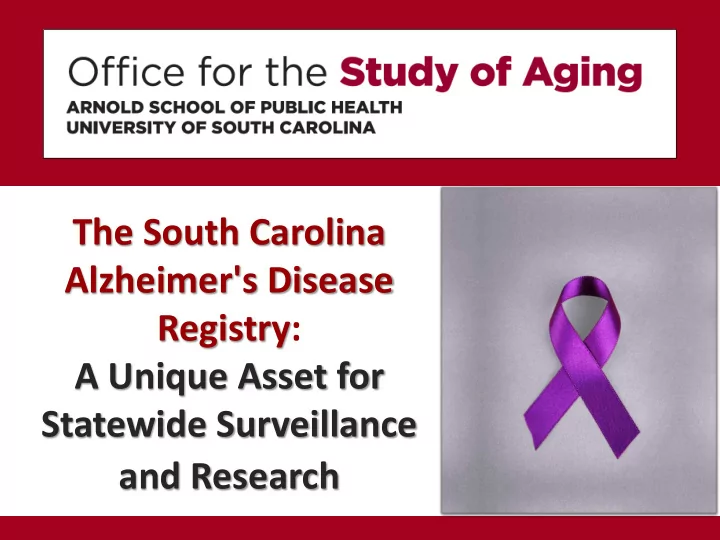

The South Carolina Alzheimer's Disease Registry: A Unique Asset for Statewide Surveillance and Research
Presenters Maggi Miller MS, PhD Lee Pearson MS, DrPH Co-director Registry Manager
Acknowledgements • SC Department of Health and • Revenue and Fiscal Affairs Human Services Office, Health and Demographic Section • Lieutenant Governor's Office • SC Department of Health on Aging • SC Department of Mental and Environmental Control, Vital Records and Public Health Health Statistics • USC School of Medicine • Arnold School of Public • SC Public Employee Benefit Health at USC Authority
Presentation Outline • South Carolina Alzheimer’s Disease Registry • Background • History and goals • Data collection procedures • Results from 2018 Annual Report • Strengths of the Registry
Background • In 2017, the percentage of those 65 years and older in SC was estimated to be 17.2% of the total population • By 2030, it is estimated that 1.1 million South Carolinians will be over 65 representing 1 in 5 residents. • An estimated 5.4 million people in the U.S. are currently living with Alzheimer’s disease (AD) • By 2050, the number of people age 65+ with AD may nearly triple to a projected 13.8 million Sources: US Census Bureau and Alzheimer’s Association
Registry History • The SC Alzheimer's Disease Registry was founded in 1988 • Includes data about individuals with Alzheimer's disease and related dementias (ADRD) • One of only three population-based state AD registries in the nation
Registry Goals • Maintain the most comprehensive state registry of ADRD in the nation • Provide disease prevalence estimates to enable better planning for social and medical services • Identify differences among groups • Help caregivers for individuals with ADRD • Foster ADRD research
Data Sources *Duplicates occur because individuals often use more than one name, social security number, or other identifying information when using health or social services.
Identifying Registry Cases • Alzheimer’s disease (AD) • Vascular dementia • Mixed dementia (AD + Vascular dementia) • Dementia in other medical conditions • e.g., alcohol/drug- induced dementia, Parkinson’s disease, dementia with Lewy bodies • conditions (e.g., HIV) + a dementia code
Information in the Registry • Diagnosis (ADRD type) • Sociodemographic Information • Age • Gender • Race • Location • Facility • Community • Unknown • Contact information for caregiver (if available)
Registry Legislation ➢ Authorized/established by state law in 1990 ➢ Grants permission for Registry to contact cases and caregivers ➢ Establishes an advisory committee for the Registry
2018 Annual Report Summary • 93,310 individuals were living with ADRD in 2014 • Based on the Registry and US Census estimates: • 11% of South Carolinians age 65+ have ADRD • 44% of South Carolinians age 85+ have ADRD • 63% of South Carolinians with ADRD are women • African Americans are at notably higher risk of an ADRD diagnosis than are non-Hispanic whites • 20% of South Carolinians age 65+ are African American • African Americans represent 28% of Registry cases
Age (in years, percent total) Under 65 10% 85+ 39% 65-74 21% 75-84 30%
Type of ADRD • 58% had a diagnosis of AD • 12% had a diagnosis of Vascular dementia • 4% had a diagnosis of Mixed dementia • 26% had a dementia related to other medical conditions
Type of ADRD Dementia in Other Medical Conditions Total Other cerebral degenerations 15,303 Dementia with other conditions 7,079 Dementia with Lewy Bodies 2,343 Alcohol dementia 1,734 Parkinson’s disease 1,725 HIV/AIDS dementia 192 Frontotemporal 170 Drug-induced dementia 65 Pick’s disease 55 Chronic Traumatic Encephalopathy 25 Huntington’s disease 24 Organic brain syndrome 14 Creutzfeldt-Jakob disease 8 Traumatic Brain Injury Dementia 1 Total (N) 22,951
Type of ADRD* by Age * Note. AD=Alzheimer’s disease or senile dementia; Vascular=Vascular dementia; Mixed=both Alzheimer’s disease and Vascular dementia; Other=dementia in other medical conditions.
Registry Cases by Gender and Type of ADRD* 80 70 67 60 62 58 % Individuals 50 55 40 45 42 38 30 33 20 10 0 AD Vascular Mixed Other Male Female * Note. AD=Alzheimer’s disease or senile dementia; Vascular=Vascular dementia; Mixed=both Alzheimer’s disease and Vascular dementia; Other=dementia in other medical conditions.
Race of Registry Cases All Others Title Hispanic 9% <1% African American 28% White 63%
ADRD Prevalence by County ADRD Prevalence for Individuals 50+, 2014
Registry Cases by Age Group and Place of Residence 90 79 80 74 70 70 64 60 % Individuals 50 40 31 30 24 19 20 14 7 7 10 6 5 0 Community Nursing Facility Unknown <65 65-74 75-84 85+
Deaths among Registry Cases by Type of ADRD* • Of those people identified with ADRD since 1988, a total of 168,885 have died. * Note. AD=Alzheimer’s disease or senile dementia; Vascular=Vascular dementia; Mixed=both Alzheimer’s disease and Vascular dementia; Other=dementia in other medical conditions.
Strengths of the Registry • Statewide population-based registry • Multiple data sources with a history of validity checks • Diagnosis by physicians of all specialties • Potential for expanded research
SC AD Registry • The South Carolina Alzheimer's Disease Registry is a unique resource for statewide ADRD surveillance and research, and it is an asset for community planning in both health and social services.
If you are interested in requesting data or would like to learn more about the Registry contact us at: osainfo@mailbox.sc.edu
Recommend
More recommend